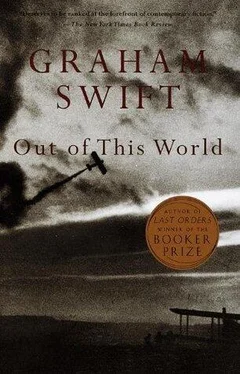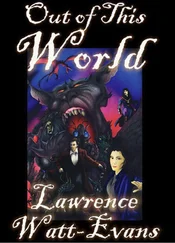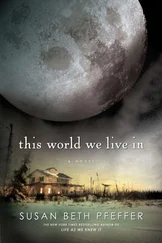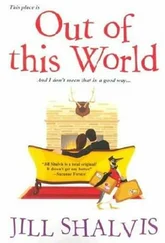Graham Swift - Out of This World
Здесь есть возможность читать онлайн «Graham Swift - Out of This World» весь текст электронной книги совершенно бесплатно (целиком полную версию без сокращений). В некоторых случаях можно слушать аудио, скачать через торрент в формате fb2 и присутствует краткое содержание. Год выпуска: 2012, Издательство: Vintage, Жанр: Современная проза, на английском языке. Описание произведения, (предисловие) а так же отзывы посетителей доступны на портале библиотеки ЛибКат.
- Название:Out of This World
- Автор:
- Издательство:Vintage
- Жанр:
- Год:2012
- ISBN:нет данных
- Рейтинг книги:3 / 5. Голосов: 1
-
Избранное:Добавить в избранное
- Отзывы:
-
Ваша оценка:
- 60
- 1
- 2
- 3
- 4
- 5
Out of This World: краткое содержание, описание и аннотация
Предлагаем к чтению аннотацию, описание, краткое содержание или предисловие (зависит от того, что написал сам автор книги «Out of This World»). Если вы не нашли необходимую информацию о книге — напишите в комментариях, мы постараемся отыскать её.
Out of This World — читать онлайн бесплатно полную книгу (весь текст) целиком
Ниже представлен текст книги, разбитый по страницам. Система сохранения места последней прочитанной страницы, позволяет с удобством читать онлайн бесплатно книгу «Out of This World», без необходимости каждый раз заново искать на чём Вы остановились. Поставьте закладку, и сможете в любой момент перейти на страницу, на которой закончили чтение.
Интервал:
Закладка:
‘Why, Mr Carmichael, working in this office is almost like a vacation in itself.’
As if I could have taken that job Frank Irving offered me.
But here’s a picture for you, Mario. Another photo from the wallet. Mum and Dad. Margate, Kent. August ’61. A beach photographer must have ambushed them, because I wasn’t there at the time. I was in the South of France. You can tell they’re on holiday by the way they’re gritting their teeth. No, they don’t exactly look like a load of laughs. But then, you wouldn’t believe that within two years of that photo they would both be dead. Shall I tell you the sad story of those two strangers, my parents?
They were so far away from me. You could have fitted a whole generation between them and me. She was almost forty when they married, and he was forty-two, and they must never have expected to produce me. Two last-chancers, signing on with each other. He was a big man, as you can see, but with a weak chest since childhood and a dry, grating cough that always used to proclaim: This is my cough, this is my affliction. But I don’t complain, no, I never complain, because, though life is no picnic, I have A Secure Job and I will one day reap the reward of A Good Pension.
She was like a parrot sitting on his shoulder. A dull, cabbage-coloured parrot. What he said, she said. Except that now, when I think of how quickly he went downhill after she died, it seems it was really she who kept him together.
They — we — used to go every year to Margate. Always Margate. Always the first two weeks in August. And always the Thanet Hotel, which was a posh name for a seaside boarding house run by a Mrs Goff, who would have had no trouble running Catterick barracks.
In the photo it’s their last holiday together, though not in the sense either of them would have imagined. The next year was going to be their last holiday, because after that there was only the Big Holiday. Retirement. He’d be sixty-five. But a week before that last holiday, in July ’62, she died. Collapsed in the grocer’s in Bruce Grove. Hospital. Dead. What — or who — you never really knew, you never really miss, do you? I had to phone Mrs Goff to cancel for him, because he was terrified of ‘letting her down’. Please don’t be angry with me, Mrs Goff, but you see, unfortunately, my wife has died. But the following summer, as the first independent act of his fully pensioned status, he was there again, all by himself. First two weeks in August. And that really was the last holiday, because, come Christmas, he was in St George’s Hospital near Epping, all tucked away in its own discreet and leafy grounds.
Margate! The Thanet Hotel! Jugs of tea for the beach! I suppose I should remember happy days, making sandcastles, the sun on my back. But what I remember most about Margate is the smell of tar. Sticky tar and seaweed. The suspicious trickles that ran across the beach out of holes beneath the promenade. Brown rust streaks on the concrete and rust clogging the struts under the pier, which always reminded me of shit. As if there were some unwritten English law that pleasure couldn’t be pleasure without a good tang of disgust. I used to say to him: Go somewhere else, do something different. Go abroad . For Christ’s sake, get it into your thick skull, I’m loaded, I’m offering. I’ll arrange it all. But I’d see his big frame starting to judder and I’d back off fast. And when I said, ‘abroad’, he’d give me this boggle-eyed, disbelieving stare, as if I’d said, ‘Moon’.
The polite phrase used to be ‘in an institution’. But he was always in an institution. The institution of virtuous drudgery. The institution of married life, the institution of the Thanet Hotel. The institution of his own prehistoric upbringing — it was when we were getting ready for that televised Coronation, setting up the aerial and adjusting the curtains, that he announced with a voice like a knell, just in case we should get too festive and too carried away by these modern inventions, that he could remember the funeral of Queen Victoria. Think of that, Mario! He could remember the funeral of Queen Victoria. He couldn’t not be in an institution. And the worst of those few visits I made before he died, to St George’s Hospital, Epping, was that he never said: I want to get out of here.
Because I sure as hell did. After only five minutes. Quick! Out! Fresh air, normality! Quick! Quick! Thank God he went so soon. Thank God his lungs beat his mind to it, by a long chalk. Because I couldn’t have gone on going to see him in that place. Those corridors! That smell. Like some evil intensification of the smell of Mrs Goff’s hallway. I couldn’t have borne watching him become like some of those things in there.
There was this grand entrance hall, which utterly belied what you were going to see inside, with a marble plaque telling you that the place had been built — in eighteen sixty-something — to house orphans. Of the Crimean War ! And above the plaque was this huge picture, which wouldn’t let you go by without looking at it, of St George and the Dragon. That was the first time it ever struck me, Mario: the patron saint of my country wasn’t a saint like you think of a saint — you know, holy, gentle, saintly . He was this chain-mailed thug, jamming a spear down the throat of a writhing beast. And dragons never existed, did they? They’re supposed to be mythical, aren’t they? But in this picture the dragon was much more alive , much more realistically painted than St George. It must have scared the pants off all those little orphans.
And now I was an orphan too …
Some unthinkable night in the Blitz? Some topsy-turvy moment in the Anderson shelter when the bombs were getting close and the lamp blew out and they thought, if not now, then maybe never? I was a war baby. June 1941. I don’t remember any of it, of course. But I have to thank Hitler and Goering and the poor aim of the Luftwaffe for the bomb-site in Thorndyke Road, three blocks from Davenport Road, which gave me somewhere to play when I was young, out of the shadow of home. Kids’ games. Cowboys and Indians. Cops and Robbers. English and Jerries, naturally. Bang bang! You’re dead! What do you think, Mario, is it wrong? Is it wrong for kids to play that sort of game?
Dad thought it was wrong, of course. ‘Running the streets’. It’s not the streets, Dad, it’s a bomb-site. But I reckoned it was worth it. He tried to wop me once for hanging out down there. I saw his arm go back, but Mum stopped him. Not that she was taking my side. She just said calmly, ‘No need for that, Eric.’ And he stopped dead.
It was all brambles and nettles down there where the houses had been, and garden shrubs run wild. Like a little nature reserve. One warm Sunday morning there was this lizard just sitting on an old lump of masonry, right in front of my nose. Who’d expect to see a lizard in Tottenham? I remember looking at it, and then making a grab for it. And then the lizard was gone but I was holding its tail between my fingers, and I thought, Oh God, what have I done? I’ve ripped a lizard in half, for no reason at all. But there wasn’t any mess, just this dry bit of tail. And when I asked my teacher, she said they could do that, just shed their tails, then grow another one. And then I thought, It’s okay. He’ll be all right. And so will I.
That’s one of the first things I noticed when Terry Gray and I went to the South of France. And again in Greece. Lizards. See them everywhere. Big ones, small ones. Green, black. On the slopes of the Acropolis. On Poros, in the garden of the villa. On the white-washed stones. Even inside, clinging to the walls. Maybe dragons are just big lizards. I told Sophie once about my London lizard. I said if I wasn’t human, that’s what I’d be. On a warm stone, lapping up the sun. Something bad comes along, like St George in his chain-mail, you just dart away. All you lose is the skin of your arse.
Читать дальшеИнтервал:
Закладка:
Похожие книги на «Out of This World»
Представляем Вашему вниманию похожие книги на «Out of This World» списком для выбора. Мы отобрали схожую по названию и смыслу литературу в надежде предоставить читателям больше вариантов отыскать новые, интересные, ещё непрочитанные произведения.
Обсуждение, отзывы о книге «Out of This World» и просто собственные мнения читателей. Оставьте ваши комментарии, напишите, что Вы думаете о произведении, его смысле или главных героях. Укажите что конкретно понравилось, а что нет, и почему Вы так считаете.












